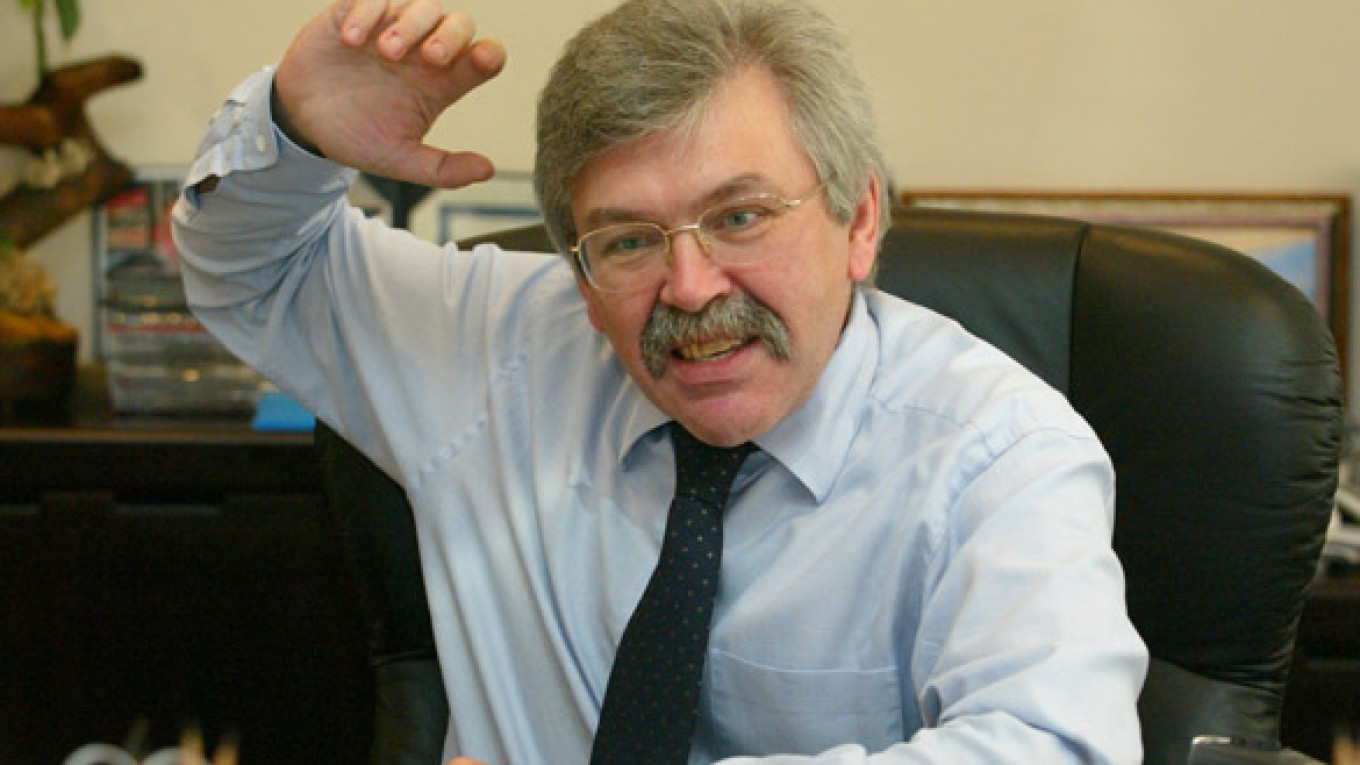Vladimir Sokolin, the head of the State Statistics Service, accused the Economic Development Ministry of playing loosely with his numbers and said in an interview published Monday that he would leave the post next month.
“The body that is the main user of our data and which compiles lots of reports and forecasts has a big temptation to direct statistics in the direction it needs,” Sokolin told Itogi magazine.
The previously independent State Statistics Service was included under the Economic Development Ministry in a government reshuffle initiated by President Dmitry Medvedev last year.
But the move was a mistake, Sokolin said, and has left the government free to pick and choose data as it orchestrates a recovery from Russia’s worst downturn in a decade.
Sokolin, 60, has been in charge of the service for 11 years, and has been working there and at its Soviet predecessor, Goskomstat, since 1971. He said in the interview that he would be transferred by the end of November to head the Interstate Statistical Committee of the Commonwealth of Independent States.
The transfer and criticism come amid infighting over plans to postpone Russia’s next census, a move Sokolin has strongly opposed. Analysts said traditional rivalries among statisticians — and their models — boiled over under the pressure of the country’s economic decline.
“Now the ministry starts to give orders: We should monitor this and that,” Sokolin said in the interview. “At least they don’t tell us how to monitor. They don’t try to manipulate figures. If they start giving such guidelines, this will mean real trouble.”
In particular, he cited his clash with the ministry over Minister Elvira Nabiullina’s decision to postpone the next census to 2013 from 2010 because of the costs of collecting population data all across the sprawling country.
“I think that was a mistake,” he said. “This is not the first time our office faces such a situation. It happens every time, when [the authorities] don’t understand the meaning of objective statistic data.”
The upcoming census has been a particularly sensitive issue for the government, which has aimed to stem a falling population through incentives for mothers to have additional children and public health campaigns — most notably Medvedev’s recent fight against alcohol consumption.
The Health and Social Development Minister Tatyana Golikova announced in late September that Russia’s population had a natural increase of 1,000 people in August, the first in 15 years, but the figure includes gains from immigration.
Sokolin was also critical of the Economic Development Ministry’s overall handling of the crisis.
“In Russia we have all the ‘pleasures’ at once — the highest inflation and the steepest recession,” he said. “Now, colleagues, explain to me what kind of economy have we built?”
Medvedev said in a televised interview Sunday that the economy could fall 7.5 percent this year, which he said was worse than anyone expected but is better than the government’s current forecast of an 8.5 percent decline.
“The expert environment, on which the government should lean when taking serious economic measures, has effectively been atrophied,” Sokolin said. “The Economic Development Ministry, sadly, cannot come up with such solutions today.”
He also disagreed with the positive “pullout” forecast made by Nabiullina’s office, saying the Russian economy has not started to recover.
“If we look at the Rosstat model, it does not confirm the Economic Development Ministry’s information that we have already started to move upward,” he said, referring to his service by its Russian abbreviation. The trend in industrial production, adjusted for seasonal effects, has been “absolutely horizontal” in the past four months.
According to data published by the State Statistics Service in August, Russian gross domestic product fell 10.9 percent and industrial production shrank 14.8 percent in the second quarter of 2009.
The Economic Development Ministry could not be reached for comment Monday.
“There have always been internal disagreements within the institutions, even in the Soviet times,” said Sergei Kolchagin, senior fellow in the Institute of Economics of the Russian Academy of Sciences, who formerly worked with the State Statistics Service. “Different institutions often have different opinions on the same figures.”
He said the statistics service had been claiming for a while that they had more methodic and precise instruments of monitoring. All data, however, should be carefully evaluated to see which institutions’ figures are most realistic, he said.
“Statistics may use different methods to eliminate a number of seasonal factors, including the number of working days, holidays, vacation periods, weather conditions and so forth,” said Sergei Aleksashenko, a former first deputy chairman of the Central Bank and an expert with the Carnegie Moscow Center. “Rosstat and the Economic Development Ministry have different models to clear out a trend, and the ministry uses its own model that often gives a more optimistic picture.”
A Message from The Moscow Times:
Dear readers,
We are facing unprecedented challenges. Russia's Prosecutor General's Office has designated The Moscow Times as an "undesirable" organization, criminalizing our work and putting our staff at risk of prosecution. This follows our earlier unjust labeling as a "foreign agent."
These actions are direct attempts to silence independent journalism in Russia. The authorities claim our work "discredits the decisions of the Russian leadership." We see things differently: we strive to provide accurate, unbiased reporting on Russia.
We, the journalists of The Moscow Times, refuse to be silenced. But to continue our work, we need your help.
Your support, no matter how small, makes a world of difference. If you can, please support us monthly starting from just $2. It's quick to set up, and every contribution makes a significant impact.
By supporting The Moscow Times, you're defending open, independent journalism in the face of repression. Thank you for standing with us.
Remind me later.


